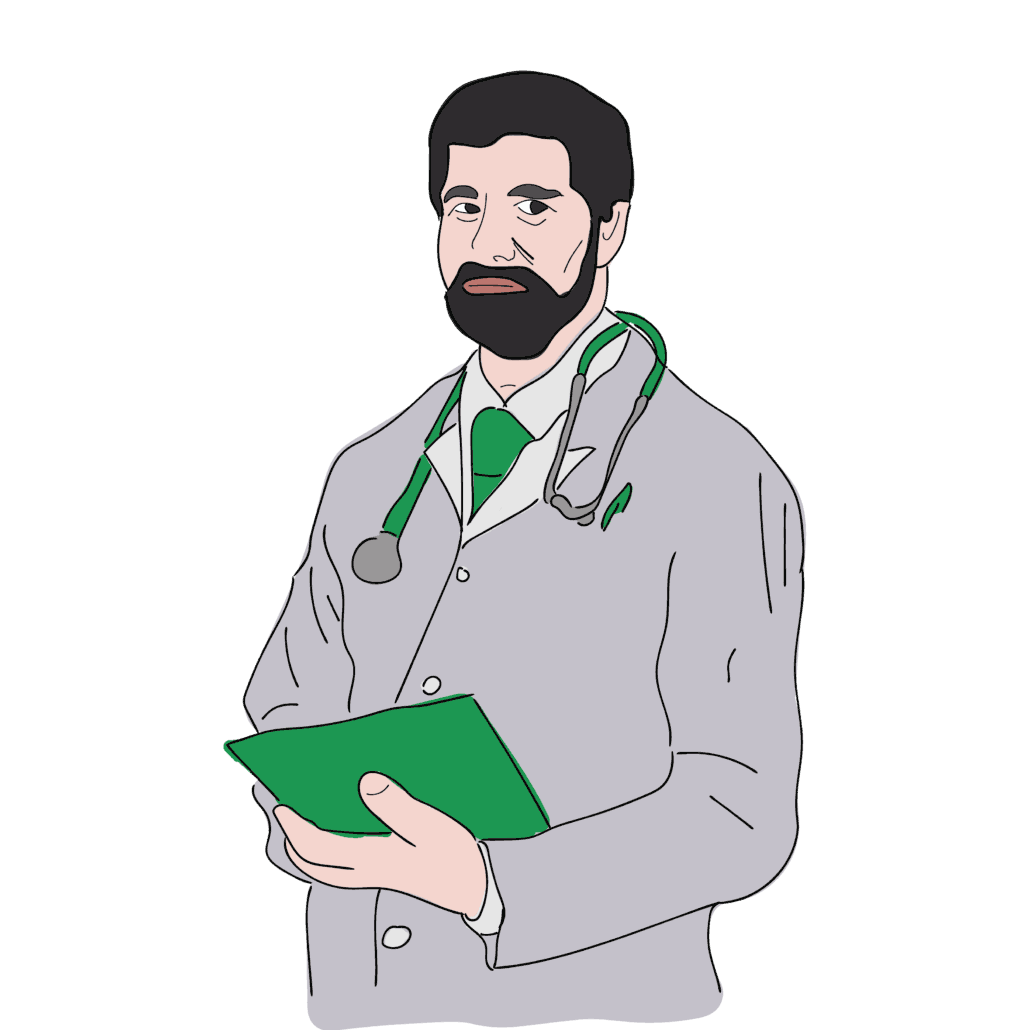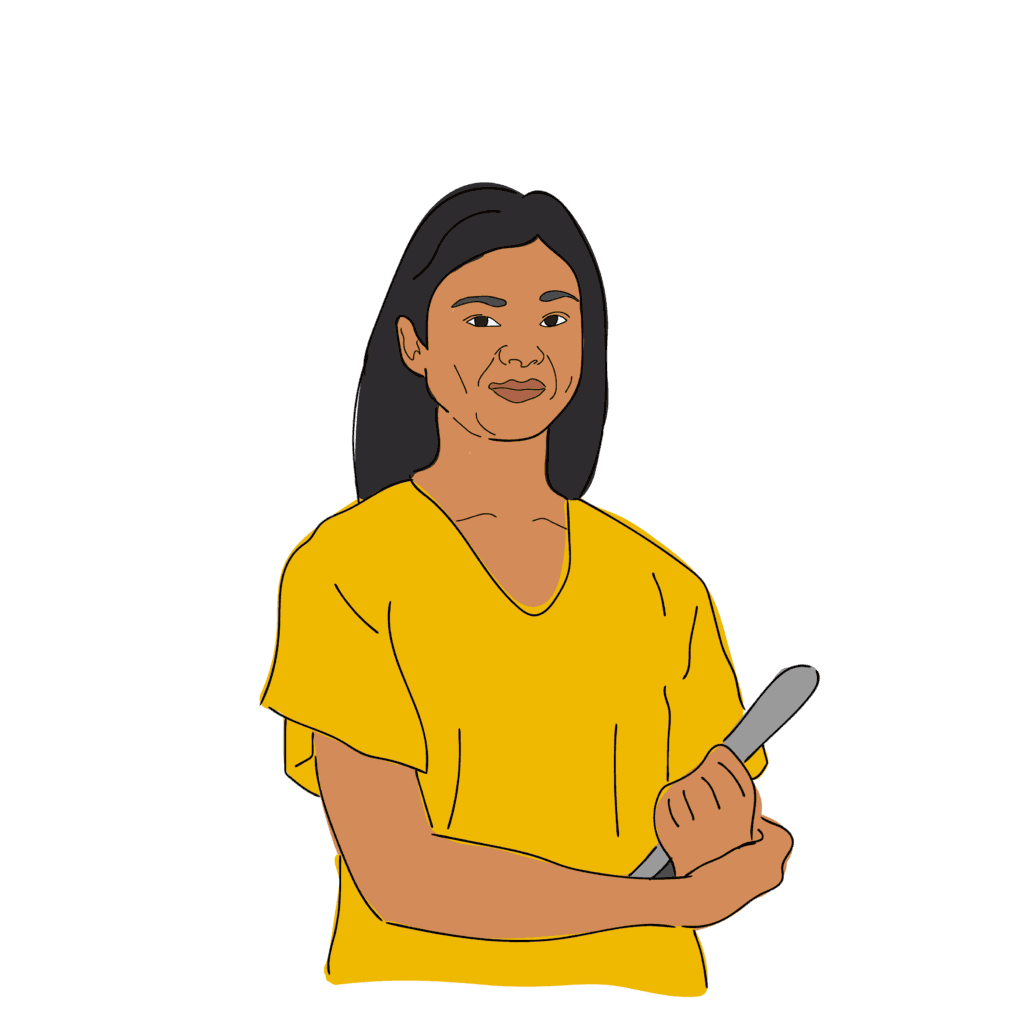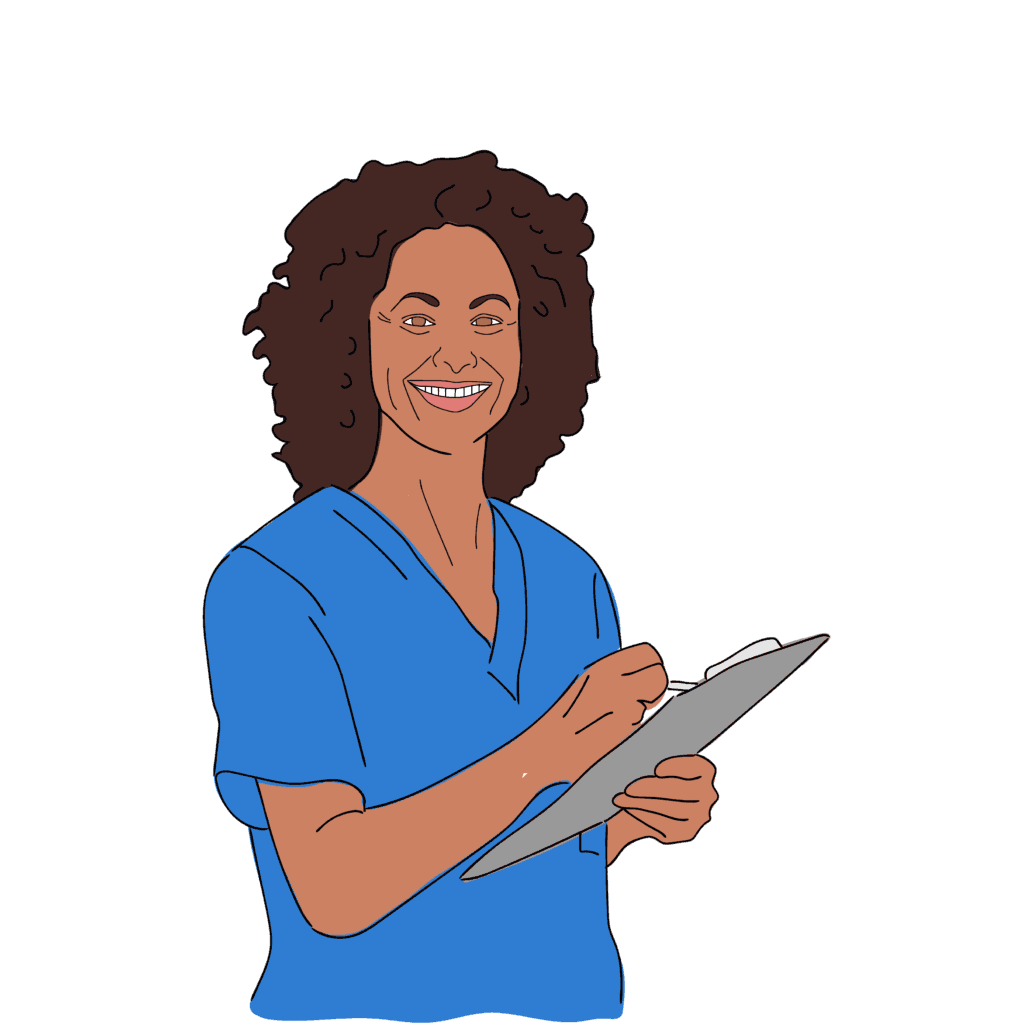Chapter 5
The Interprofessional Healthcare Team
Looking Back
Looking back on the case today, I can see that I just wasn’t used to working as part of an interprofessional health team. In my previous roles, I didn’t discuss the patient with other team members, and decisions about care weren’t made collaboratively.
On interprofessional health teams, we practice consensus decision making. Every member of the team has their own perspective and by pulling all these perspectives together, we can provide better patient care.
We work collaboratively to solve problems.
Every member of the team has their own perspective and by pulling all these perspectives together, we can provide better patient care.

Professional Roles
Pharmacist

Scope of Practice
Pharmacists administer prescription medications and medical devices to patients.
In some situations, pharmacists are permitted to renew or amend prescriptions, as well as administer injections or inhalations.
Professional Lens
Built into their professional code of ethics is a commitment to benefit their patient and do no harm. They respect their patients’ agency and they take accountability for acting in the best interest of their patients’ and the public.
Social Worker

Scope of Practice
Social workers assess, diagnose and treat individual, interpersonal and societal problems. They use interventions and strategies designed to help improve the psychosocial well-being and functioning of their patients.
Professional Lens
A core principle within the social work profession is respect for self-determination. The profession is based on the idea that all clients have the right and capacity to determine what their goals and objectives should be. Social workers treat their work as a joint endeavour that they undertake with their clients.
They also pay close attention to the way they interact with their clients, making sure that their personal values, options and beliefs don’t negatively impact their clients.
Home Care Coordinator

Scope of Practice
In collaboration with patients and their families, care coordinators assess care needs, determine eligibility for services, and develop individual care and service plans. They link their patients with service providers and coordinate the delivery of care.
Professional Lens
Care coordinators typically have a background in nursing, physiotherapy, occupational therapy or social work. To be a care coordinator, one must be a member of a regulatory body for one of these professions.
Care coordinators are concerned with balancing the needs of their patients with available resources. They develop helping relationships with their clients and are committed to ensuring their patients’ values and preferences are respected.
Nurse & Charge Nurse

Scope of Practice
The scope of practice is evidence-informed, based upon the competencies to practice from the College of Nurses of Ontario or the respective provincial or territorial regulatory body. Nurses are accountable for determining whether they’re competent to perform an activity or procedure.
Professional Lens
A charge nurse is usually a nurse who has many years of experience. The charge nurse is typically involved with the unit’s planning for care resources such as budgets, staffing and the overall delivery of patient care of the unit for all patients.
For nurses in general, maintaining their patients’ trust is of utmost importance.
They strive to treat patients as individuals and respect their dignity and autonomy.
To ensure that public maintains their confidence in the nursing profession, nurses ensure that they act in a way that positively represents nursing – not just in their professional lives but in all areas of their life.
Physician

Scope of Practice
The scope of practice for physicians is broad and is dependent on their area of specialization, the health care environment and the context that they practice in.
Professional Lens
The values foundational to field of medicine are compassion, service, altruism and trustworthiness. Doctors strive not just to follow medical procedures, but also to practice empathy for their patients as they attend to their needs. Service is about putting the patient first in an attempt to benefit them. Similar to service, altruism is about taking action unselfishly and with regard for others. Finally, doctors must earn and maintain public trust through their professional actions, as well as within their personal lives.
Physiotherapist

Scope of Practice
Physiotherapists assess, prevent and treat issues related to movement. These may be a result of injury, pain and/or disorders. They strive to improve their patients’ functioning and quality of life.
Professional Lens
Physiotherapy is an evidence-based practice. Physiotherapists’ central focus is on the safety of their patients. They strive to always put the patient first. They respect their clients’ autonomy and ensure the client is actively involved in decisions surrounding their care.
A core competency for physiotherapists is the ability to work effectively within a team environment. Physiotherapists often work as part of an interprofessional health team, where they must communicate and collaborate.
Occupational Therapist

Scope of Practice
Occupational therapists help clients with things that are barriers to everyday activities. They help clients learn new ways of doing things and develop and retain skills. They identify equipment that will make tasks easier and assist clients in learning how to use the equipment. They may also modify a client’s environment so that it’s better suited to their needs.
Professional Lens
Within the field of occupational therapy, communication is very important. Occupational therapists work closely with their patients, focusing on their needs, wishes and abilities. They respect the autonomy of their patients.
The Dietitian

Scope of Practice
A dietitian’s role involves several different aspects. Dietitians work directly with clients, providing nutritional advice and interventions to improve their health. Dietitians also conduct research around diet related issues and participate in life-long learning. They also play a role in educating other health care providers about nutrition.
Professional Lens
Dietitians practice within legislated professional regulations, where they’re expected to uphold standards of practice.
Dietitians respect their clients’ autonomy and individuality. They approach problem solving and decision making systematically.
All of these perspectives play an important part in patient care. But in order to bring them all together, everyone needs to communicate the information they’ve gathered with the rest of the team. In other words, shared decision making and collaborative healthcare depends on communication.
Questions for Herminia
What is consensus decision making?
Consensus decision making means that the team works together to find a decision that all can agree with. Refer to the Consensus Decision Making Guide for more information.
What is collaboration?
Working together and sharing ideas and knowledge is collaboration. Communication skills can help with collaboration. Check out the Top 10 Communication Skills for more information.
What do they mean by perspective?
A perspective is a viewpoint that is shaped by a person’s professional role (assessments) and values.
How do you know when care is better? Better than what?
Better care is care that is consistent with the regulated practice and standards for each profession.